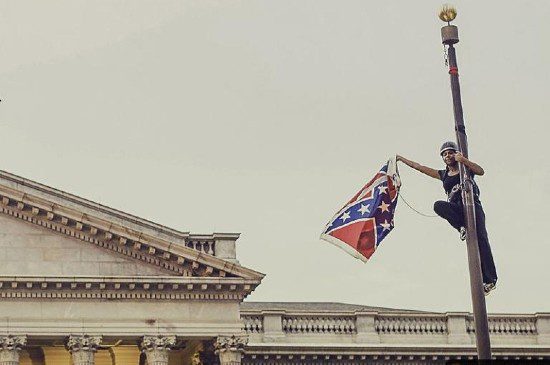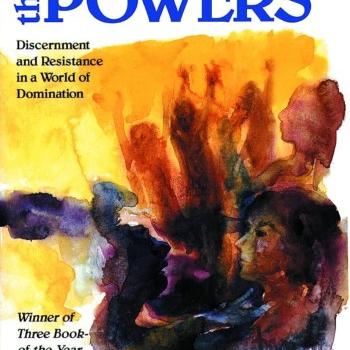Yesterday was Confederate Memorial Day in Alabama … but then again, every day is Confederate Memorial Day in Alabama.
Let’s mark the occasion by recalling the moment eight years ago when Brew Newsome climbed the flagpole at the South Carolina statehouse and, reciting Psalm 27, tore down the symbol of the would-be slave empire.

Seeing that made me believe, for a moment, that we might see the goodness of the Lord in the land of the living.
Things like “Confederate Memorial Day” and the continuing presence of actual granite or bronze Confederate memorials are a reminder that, as playwright Daniel Glenn put it, “King Philip’s Head Is Still on That Pike Just Down the Road.”
“King Philip” was the English name given to Metacomet because he was the Wampanoag’s elected leader and the people of the Plymouth Colony didn’t comprehend the idea of being led by someone other than a king. After Metacomet was slain in the so-called “King Philip’s War,” the Puritans cut his body into four pieces and hung them from trees, then sold his widow and children into slavery. Metacomet’s “head was mounted on a pike at the entrance to Plymouth, Massachusetts, where it remained for more than two decades.”
For more than 20 years, you couldn’t go to church or to market or to court in Plymouth without walking past that grisly memorial. It’s not clear when it came down, or why. It might have been an act of repentance or it might have been gravity. One legend says it was “stolen” by Wampanoag warriors and, at last, given a proper burial.
I don’t think I’m suggesting anything bold or controversial when I say that it’s a Good Thing that Plymouth’s town square is no longer dominated by a severed head on a pike. This is not to say that removing that spectacle absolved Plymouth of all of its sins or that it solved every other imaginable problem facing the place. No one is saying that. No one ever would say that any more than anyone has ever said that Bree Newsome magically ended all of South Carolina’s problems when she tore down the vile Klan-hankie decorating its capital.
Which is why it was horribly disappointing to read this bit of ignorant, fingers-jammed-in-ears nonsense from someone who generally pays attention and knows better:*
The removal of the monuments … will not make the two races less divided or less prejudiced. It will not improve the worldly lot of any black person or any other person. What we are up against is an extractive economy run by a tiny minority of the wealthiest people, and, from that, the impoverishment, pollution, and poisoning of the natural world, the disintegration of all human communities, and the ill health of individuals and families. Compared to these real and pressing problems that belong to us all, the removal of statues and other works of art is easy. The dead are ideal enemies. Opposing the dead is the most expedient route to virtue for public officials, as well as a perfect distraction from the problems that are present, urgent, and difficult.
Just replace “the removal of the monuments” with “Finally Taking King Philip’s Head From Off That Pike Just Down the Road” and the perverse absurdity of this paragraph becomes clearer.
The first two sentences are absolutely false. That’s not solely my opinion — it’s also the argument of the people who first conceived of and constructed these monuments, and of the generations who have since fought to protect them. The presence of these monuments does, in fact, increase division and prejudice — that’s what they were designed to do.
And the removal of these monuments will, in fact, improve the worldly lot of every Black person in these communities. Not because it will magically fix every other problem, from capitalism to climate change to cancer, but because the presence of these memorials is an explicit threat to some and an explicit permission slip for others. That ever-present threat and that ever-present promise of impunity are evils in themselves, but they are also enduring evils that serve to distract from and prevent us from addressing, for example, “an extractive economy run by a tiny minority of the wealthiest people, and, from that, the impoverishment, pollution, and poisoning of the natural worlds, the disintegration of all human communities, and the ill health of individuals and families.”
Lecia Brooks describes what it was like to move from Los Angeles to Alabama in 2004 and to find herself surrounded by memorials and symbols of the Confederacy: “I thought, ‘Oh, my God, what are you trying to tell me? What is the message when I would see these images everywhere?’ And the message I received, as a Black person, was, ‘OK, we are still here, and we are watching.’”
Or look again at that story we linked to last week from Oklahoma, where a county sheriff and county commissioner were recorded talking about what they regarded as the good old days:
Jennings, the commissioner, then discussed how many people might run for sheriff, according to the newspaper story.
“They don’t have a goddamn clue what they’re getting into,” he said. “Not this day and age. I’m going to tell you something — if it was back in the day, when Alan Marston would take a damned Black guy and whoop their (expletive) and throw them in the cell, I’d run for (expletive) sheriff.”
Clardy responded by saying, “Yeah, it’s not like that no more,” the newspaper reported.
Jennings then said Black people have more rights than others, according to the Gazette.
“Take them down to Mud Creek and hang them up with damned rope,” he said. “But you can’t do that anymore. They’ve got more rights than we’ve got.”
Alan Marston was, apparently, a legendarily fearsome white supremacist sheriff who wielded violent intimidation and lawless law enforcement to ensure that Black people and Choctaw residents of the county never challenged their status as second-class citizens. A statue of Marston in the town square would be a reminder of that. It would be a threat to Black and to Choctaw residents (know your place or get beaten, jailed, or lynched) and it would be an offer of permission and impunity to white residents (crimes against second-class citizens will not be punished).
It would, in other words, convey the same threat and promise as a statue of Robert E. Lee or of Nathaniel Bedford Forrest.
Forrest and Marston are dead but the message of memorializing them is not, and there’s nothing “ideal” about the enemy of that living message. It’s the same threat and promise communicated last month in the expulsion of two Black legislators in Tennessee, and again in the re-hiring of the police officer who killed Breonna Taylor.
There’s nothing dead, buried, or “past” about it. King Philip’s head is still on that pike.
Diana Butler Bass wrote about the living history of McCurtain County, Oklahoma — a history that includes lynchings and impunity for white men who kill Black people:
And that’s one of the reasons history is so important right now. If we don’t know, for instance, that McCurtain County has a deep history of racial violence, lynching, and official corruption, then we might think the recent episode involves three bad individuals. The problem could be solved by censure or resignation.
If you understand this as one more act in a longer history of power, land, and race, then different choices present themselves. Maybe you want to cover up things that happened in the past because they’d be bad for business, bad for development, bad for your image. Surely, you don’t want honest historians. A good PR firm would be a better choice.
Or, she suggests:
We might choose a different path to the future. Knowing what happened around 1910 and 1980 can build moral muscle in a community — and give rising generations a chance to make better decisions about policies, politics, laws, and their own personal lives. Do you really want to be in the same photo as your ancestors smiling at a brutalized body hanging from a tree? Would you like to be remembered as a judge who let off a murderer? Do you want to be caught on tape laughing about killing a journalist? Apparently, the answer is yes — in McCurtain County — if you don’t know or care about honest history.
Until it is no. Until history demands accountability. Until somebody says — no more, not me, not my children. We don’t have to live like this any longer.
And then things can change. But you have to know what needs to be changed — the systems, structures, and stories of sin that surround us, the past evils we may breathe in without any awareness — before you can resist the pull of buried history.
This kind of talk is bound to raise the hackles of some academic historians who would describe what Butler Bass is calling for as the dangerous search for “useable history” in pursuit of some idea of “progress.” These historians seem — at least to this non-historian — to be so concerned with the myth of inevitable progress that they’ve come to view even the desire for progress with suspicion. They suggest it’s arrogant for us to look back at the past or to look around at the present and to suggest things could be better. And then, from an admirable — but abstract — commitment to “humility,” they suggest that “better” is an ineffable, unknowable, inconstant mystery beyond our ken.
Hogwash. You know better. Your mother told you that and she wasn’t wrong. We all know better. And we all know that better is always an option and never a distraction.
“I remain confident of this: I will see the goodness of the Lord in the land of the living.”
* The quote here is from Wendell Berry’s new book, The Need to Be Whole: Patriotism and the History of Prejudice.
Berry’s poems, novels, short stories and essays are a deep well of wisdom, truth, and beauty. He writes with a searing clarity, usually about farming, marriage, and poetry, and usually all at once and in a way that also applies to everything else, even that which seems wholly unrelated to farming, marriage, and poetry.
I admire, rely on, and return to, Wendell Berry more than perhaps any other living writer. Read his fiction, his poems, his essays, and you will be rewarded and challenged and inspired.
Also, he’s Baptist. In the best way.
But that paragraph quoted above is the kind of condescending, self-defeating, dismissive horseshit that comes from not listening to actual humans. It’s indefensible.
The most charitable interpretation of that paragraph is that it is utterly banal: An argument that removing racist monuments is not sufficient as a solution to every problem facing humanity. Well, no duh. Who’s saying otherwise?
And there is the larger problem, which is that even this most-charitable of interpretations involves a form of reductive dishonesty — the claim that others, others he hasn’t bothered to listen to, are saying something they’re not saying for reasons he presumes must be unworthy (“the most expedient route to virtue”). That ugly line of thinking leads to a clumsily pointless point: If something is easy and won’t solve every other imaginable problem, then you shouldn’t do it.
Feh. Test everything; hold onto the good. Even with Wendell Berry.













